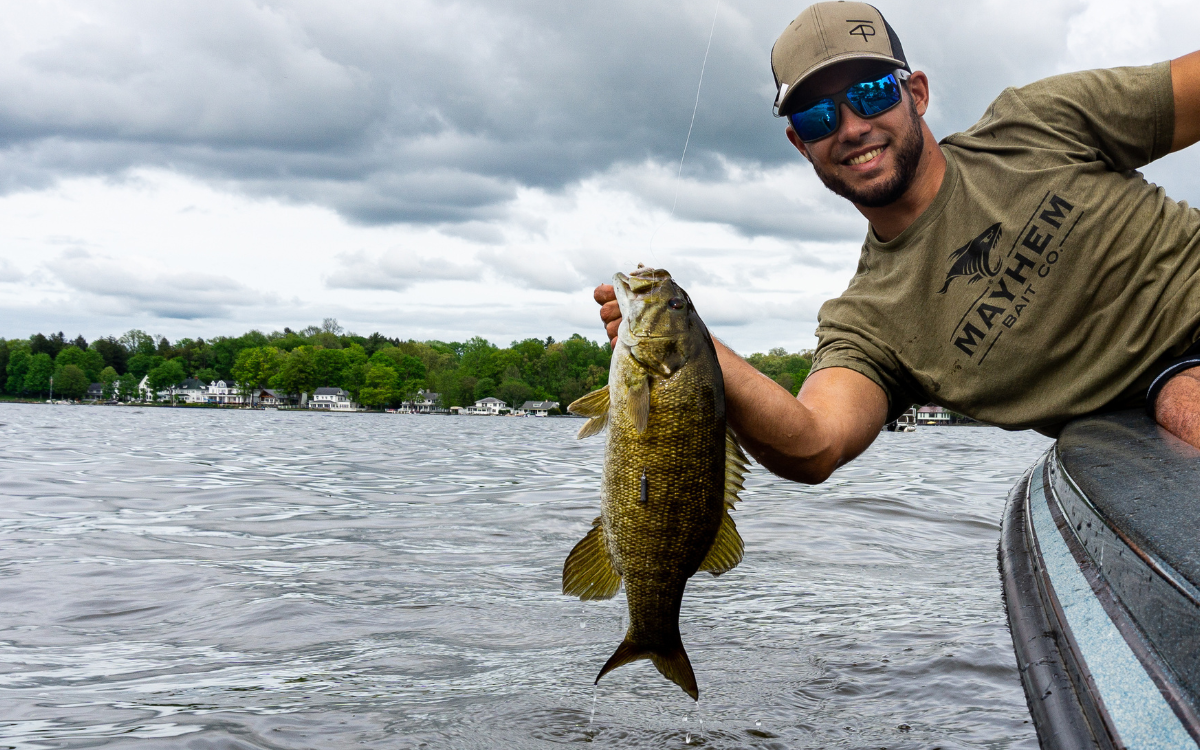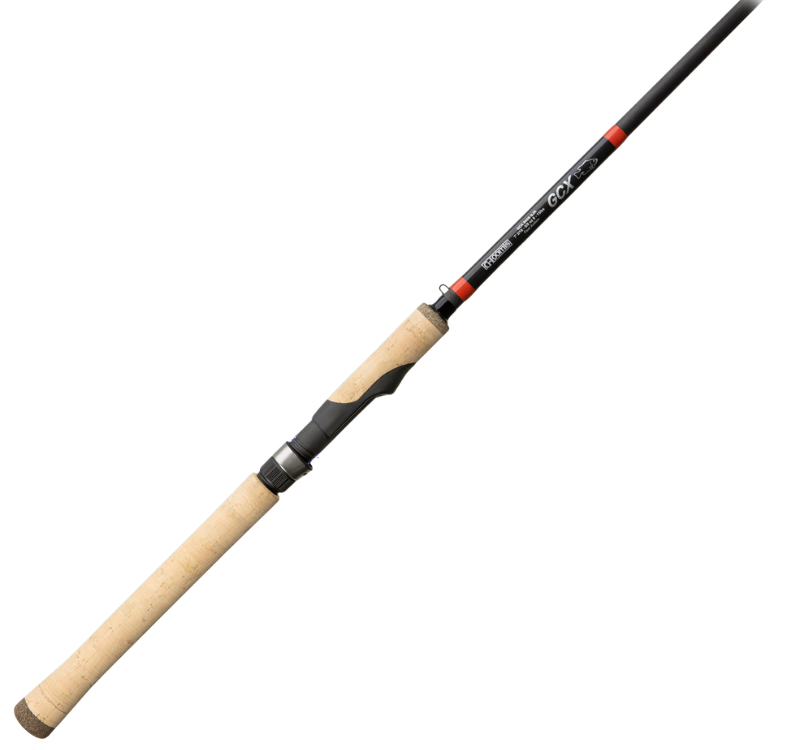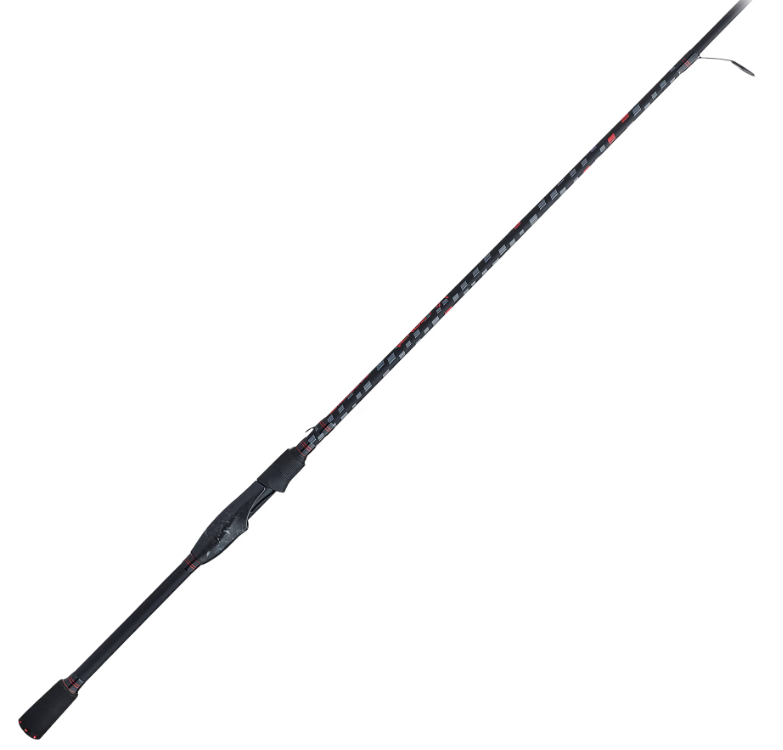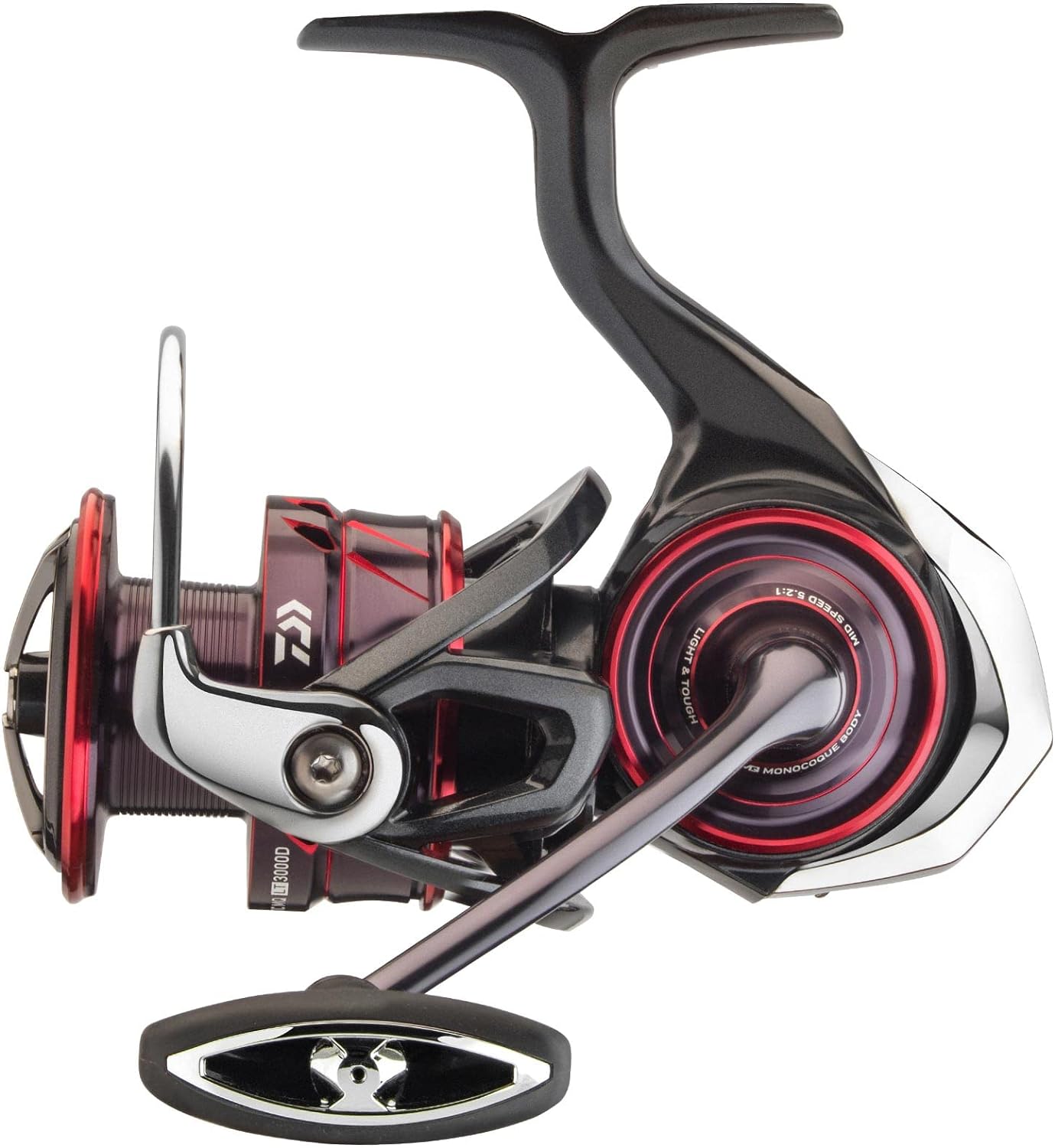We may earn revenue from the products available on this page and participate in affiliate programs. Learn More ›
By most accounts, the drop shot got its start out West in the clear water impoundments of California. These highly pressured bodies of water have plenty of giant bass, but after years of seeing every jig, jerkbait, crankbait, and swimbait out there, they learned to avoid them. That’s where the drop shot proved its worth.
The drop shot has since become a staple in most bass boat decks any time of year. It’s a technique that any serious bass angler knows how to rig and when to throw. I’ve thrown the drop shot all around the country, from Texas to New York, and I’ve found that it works everywhere. Here’s everything you need to know about fishing a drop shot.
The Drop Shot Rig
In essence, a drop shot is anchored by a small lead or tungsten weight at the end of the line. About 8 to 12 inches above the weight is a small hook and a soft plastic worm or minnow. The rig can be fished vertically, or cast out and slowly worked back to the boat similar to a Texas rig.
How to Tie a Drop Shot Rig
Tying up a drop shot should take no more than 2 minutes, it’s quick and simple. Below is a step-by-step guide.
Step 1: If you’re fishing with a braid to fluorocarbon leader, you’ll need to attach the fluorocarbon to the braid. Use either an FG knot, or an Alberto knot.
Step 2: Thread your hook 8 to 12 inches above the bottom of your fluorocarbon leader, then using a Palomar knot, tie on the hook. A quick tip: thread the end of the leader back through the eye of the hook (top to bottom) before putting on the weight. This will keep the hook straight up and down.
Step 3: Using the line clip, or a simple clinch knot, attach your drop shot weight to the bottom of the line.
Step 4: Nose hook your soft plastic lure.
What Makes the Drop Shot So Effective?
Most bass live along the bottom throughout the year, that’s where the cover is. Whether it’s a boulder, a laydown, or a ledge, these ambush predators are able to hide and attack unsuspecting bait fish as they swim by or are carried past in current. The drop shot is the perfect representation of that feeding cycle. The small soft plastic bait fish “swimming” along just above the bottom is such a natural presentation that bass have a hard time distinguishing your lure from the real thing.
The simplicity of the technique might be why it works so well, along with the fact that before it came along, most anglers were either fishing high in the water column, or maintaining bottom contact with only jigs and crankbaits. In other words, bass simply hadn’t seen a soft plastic presented this way.
For a deep dive video on the drop shot, check out this great video from my friend TylersReelFishing.
When to Throw a Drop Shot
Picking the right time to throw a drop shot isn’t all that complicated. Realistically, you can throw it any time of year and probably get bass to bite. But, if you’re looking for a banner day on a drop shot, it’s hard to beat the spawn and early post-spawn.
Fishing for bass during the spawn isn’t as touchy of a subject as fishing for trout on redds, but it’s a close second. Some anglers (like myself) love fishing the spawn and the challenge of it, while others choose to stay home, stating they don’t want to interfere with the spawning process. I get that, but if you’re like me and you enjoy fishing for bass during that time of year, I recommend giving the drop shot a try.
When the bass lock down on their beds, they’re incredibly territorial. They spend the vast majority of their time chasing off panfish that are trying to score an easy meal on their eggs. This makes them vulnerable to a drop shot, as you can cast it close to their bed and simply shimmy that bait at eye level with slight twitches of your rod tip. Smallmouth are especially susceptible to the drop shot during the spawn, but largemouth can be duped as well, it just might take a bit more time and more precise casting.
If you prefer to wait until the post-spawn to target bass, that’s cool too. The drop shot is a great option as fish begin to flee the shallow spawning flats and head to the first drop-off or point nearby to recover and feed. Depending on where you are in the country, this early-summer time frame brings water temperatures in the high 60’s to low 70’s and the bait fish will be staging in the middle of the water column, following the thermocline to stay cool and evade predatory species.

When these balls of bait fish swing by a point or drop off in the post-spawn, the bass can’t help but gorge themselves. Placing a drop shot in front of them is like dropping a cheeseburger in front of someone who just emerged from a seven-day hike in the backcountry. They just can’t resist it. Working it similar to a Texas rig this time of year seems to be the best way to cover water and still get plenty of bites. Make long casts along the drop off and slowly drag or gently jig the rig back to you. When you feel a thump, set the hook.
The Gear You Need to Rig and Fish a Drop Shot
Picking the Right Drop Shot Rod and Reel
In my opinion, the most essential piece of gear for fishing a drop shot is the rod you choose. Most bass anglers know there are plenty of technique specific rods you can buy. The drop shot has gained so much popularity that it is no different. Brands like G.Loomis have introduced drop shot specific rods with each line they produce. Their new GCX spinning rod is a great option for someone looking for a drop shot specific rod.
If you’re looking for a cheaper rod that can be used for more than just a drop shot, look for a rod that’s about 7’ long, has a fast or extra-fast action, and a medium-light or medium power. You want a rod that has plenty of bend since this is a finesse tactic that requires light line. Something like this Abu Garcia Vendetta would be a great option.
Check out our full review of the best drop shot rods.
Picking the Right Drop Shot Reel
While the rod is the most essential piece of gear, the reel you choose is a close second. A high-quality drag is going to make a world of difference when it comes to fighting and landing big bass on light line. Selecting the right doesn’t have to be too hard, however, as we recommend the winner of our best overall spinning reel, the Daiwa Ballistic MQ LT 2500D. The reel is lightweight, incredibly smooth, and the drag is perfect for fighting hard pulling smallmouth from the depths with a drop shot.
Drop Shot Baits
As with most bass fishing techniques, when picking the “best” lures, it really boils down to preference. With that, my favorite drop shot lures typically imitate a minnow. I’ve had great days on the water throwing a Gary Yamamoto Shad Shape Worm, and I’ve caught some of my biggest drop shot bass throwing a Berkley PowerBait MaxScent Flat Worm.
Read our review of the best drop shot baits.
The Best Drop Shot Hooks
Picking the right hook for a drop shot is also left up to preference, but most anglers choose light wire circle-style hooks. My go-to is the Owner Sniper Finesse Hook, it’s small enough to trick bass into biting the nose hooked minnow, and strong enough to keep big bass pegged during long fights and drag screaming runs.
Drop Shot Weights
When selecting drop shot weights, there are three common options to have on deck. Cylindrical weights, teardrop weights, and ball weights. All three have different applications based on where you’re fishing a drop shot. You can also pick between lead weights and tungsten. While tungsten is much more expensive, it also offers more sensitivity, allowing you to tell what is bottom and what is a bite more easily.
Cylindrical weights work best when fishing a drop shot around grass. The cylinder weight seems to slide through young, emergent grass without getting caught up like a teardrop or ball weight does.
Teardrop weights are a go-to when fishing a drop shot around big rock structures, the teardrop shape helps keep the weight from sticking between rocks, where cylindrical weights tend to sink down in.
Ball shaped drop shot weights seem to work best when fishing around pea gravel or mud. In these areas, the weight will slide along the bottom well and help you keep your bait in position whether you’re dragging or vertical dropping.
Line for Drop Shotting
The final piece to the drop shot rigging puzzle is what line to put on your reel. Avid bass anglers often fish spinning reels with a braid-to-fluorocarbon leader. For my braided line, I like to go with 10-pound Daiwa J-Braid, but most braided lines will do the trick. As for the fluorocarbon leader, I tend to lean on the 8-pound Sunline FC.
Final Thoughts and Tips on How to Fish a Drop Shot
Even though the drop shot is a simple rig, mastering how to fish a drop shot requires plenty of time on the water. Trial and error will help you find out what tactics, and gear work best for you.
The drop shot has a reputation of only catching small fish, but once you really start to understand when and where to throw it, you’ll start tricking some of the biggest bass in the lake. Since it’s a finesse technique, remember to have patience, work it slow, and keep the slack out of your line. Not every bite will send a jolt down your rod, but typically, when a bass bites a drop shot, you’ve got a great chance of getting a hook into the roof of their mouth.




